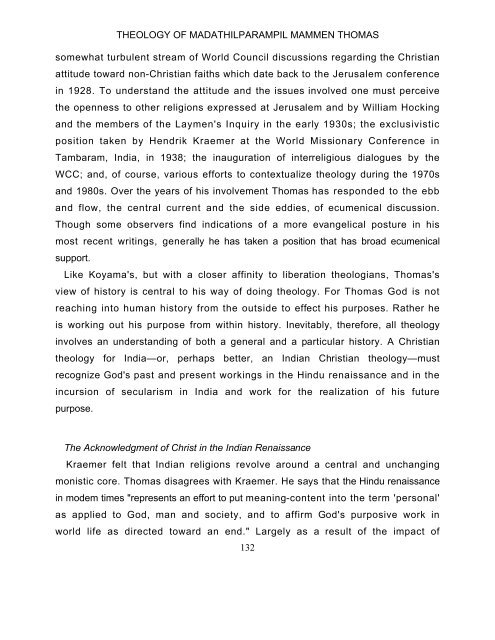MM Thomas - Life, Legacy and Theology
Create successful ePaper yourself
Turn your PDF publications into a flip-book with our unique Google optimized e-Paper software.
THEOLOGY OF MADATHILPARAMPIL MA<strong>MM</strong>EN THOMAS<br />
somewhat turbulent stream of World Council discussions regarding the Christian<br />
attitude toward non-Christian faiths which date back to the Jerusalem conference<br />
in 1928. To underst<strong>and</strong> the attitude <strong>and</strong> the issues involved one must perceive<br />
the openness to other religions expressed at Jerusalem <strong>and</strong> by William Hocking<br />
<strong>and</strong> the members of the Laymen's Inquiry in the early 1930s; the exclusivistic<br />
position taken by Hendrik Kraemer at the World Missionary Conference in<br />
Tambaram, India, in 1938; the inauguration of interreligious dialogues by the<br />
WCC; <strong>and</strong>, of course, various efforts to contextualize theology during the 1970s<br />
<strong>and</strong> 1980s. Over the years of his involvement <strong>Thomas</strong> has responded to the ebb<br />
<strong>and</strong> flow, the central current <strong>and</strong> the side eddies, of ecumenical discussion.<br />
Though some observers find indications of a more evangelical posture in his<br />
most recent writings, generally he has taken a position that has broad ecumenical<br />
support.<br />
Like Koyama's, but with a closer affinity to liberation theologians, <strong>Thomas</strong>'s<br />
view of history is central to his way of doing theology. For <strong>Thomas</strong> God is not<br />
reaching into human history from the outside to effect his purposes. Rather he<br />
is working out his purpose from within history. Inevitably, therefore, all theology<br />
involves an underst<strong>and</strong>ing of both a general <strong>and</strong> a particular history. A Christian<br />
theology for India—or, perhaps better, an Indian Christian theology—must<br />
recognize God's past <strong>and</strong> present workings in the Hindu renaissance <strong>and</strong> in the<br />
incursion of secularism in India <strong>and</strong> work for the realization of his future<br />
purpose.<br />
The Acknowledgment of Christ in the Indian Renaissance<br />
Kraemer felt that Indian religions revolve around a central <strong>and</strong> unchanging<br />
monistic core. <strong>Thomas</strong> disagrees with Kraemer. He says that the Hindu renaissance<br />
in modem times "represents an effort to put meaning-content into the term 'personal'<br />
as applied to God, man <strong>and</strong> society, <strong>and</strong> to affirm God's purposive work in<br />
world life as directed toward an end." Largely as a result of the impact of<br />
132


















